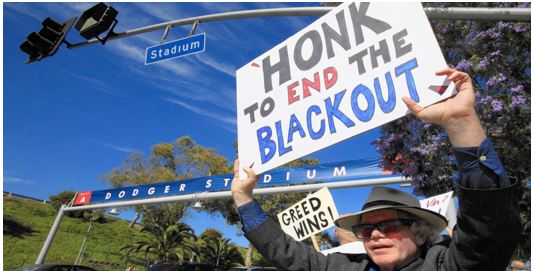CommentsBAD DEAL KEEPS GETTING BADDER--Now, this very week, is time for Time Warner to have a fire sale on its obnoxiously priced SportsNet LA channel, not just for the good of Los Angeles and Dodger fans, but to save its own hide.
Time Warner’s latest ruse to get us to pay a king’s ransom to see The Azul’s remaining morsels of greatness is another colossal failure. Other SoCal TV providers are doing us a great favor by balking at TW’s offer of a 30% lower rate for the 2016 season, because they would be required to pay the already-rejected inflated prices for the 2017 season and beyond. And despite the best laid plans of Major League Baseball, the Dodgers are still viewable. More on that further down.
Two baseball seasons ago, Time-Warner swung and missed in its prediction that our love of The Azul would trump the cost of viewing them. It vastly overpaid for the rights to broadcast the team’s games, and its overpriced, underperforming, oft-injured talent whose 9-figure contracts for Adrian Gonzalez, Carl Crawford and Josh Beckett were dumped by the Boston Red Sox just a few seasons earlier. Because other TV distributors would not pay their ransom and pass the cost along to us, the games were seen (and paid for) by far fewer homes than they ever imagined, and TW lost a ghastly amount of revenue.
Fans were deprived in 2014 of southpaw Clayton Kershaw’s Koufaxian 21-3, 1.77 record, who was leading the league in nine statistical categories, was an All-Star, a Cy Young Award winner and MVP. They also missed one of the few remaining seasons of an expiring, beloved commodity known as Vin Scully and his golden voice.
TW remained at an impasse with carriers for the 2015 season and, again, the people were deprived of greatness, missing out on righty Zack Greinke’s 19-3 and breathtaking 1.66 ERA when he and Kershaw finished #2 and #3 in the Cy Young race. And the fans endured yet another lost Scully season in which he called fewer and fewer games.
Now the 2016 season is on our doorstep and the Dodgers team is more dubious than ever.
Greinke, 32, departed for a massive new contract from the far worse Arizona Diamondbacks. Kershaw, 28, who shall remain one of the biggest names in baseball for years to come, is a disturbing 1-5 over the past three postseasons. And even if the Dodgers do reach the postseason, they have gone past the first round of playoffs only three times since 1988. And it is most likely Scully’s swansong.
What then, Time Warner? Don’t look for Guggenheim Partners, the team’s owner, to cut you a break on your bad deal. Lure back the viewers now while there is still something worth watching.
Last summer, the price of TW’s stock tumbled, along with that of its peers, by 22 percent based in part on cable-cutting by households that are no longer captive to your Dodgers ransom, legendarily poor customer service, and “blazing fast” internet that rarely and inconsistently reaches its promised “up to” 200 megabyte per second speed.
For a little more than $100 for the entire season, baseball fans can buy a Major League Baseball season pass for every game, for every team, in crystal clear hi-def. While that package alone doesn’t get one access to the local teams, which are blacked-out, for about $5 per month for the course of the season, they can buy access to one of several internet anonymizer services, which does a fake-out on MLB computers that prevent it from knowing with certainty in what city the fans’ computer-connected televisions or smartphones are located. If MLB is unable to determine where the viewers are physically watching the game, it is unable to black out games where it intends. Enterprising friends and neighbors have started to split this total cost. The triumph of competition over the cable company!
Come 2017, with Kershaw as the possible lone star remaining at Dodger Stadium, Time Warner may have nowhere left to turn.
(Daniel Guss, MBA, is a writer who lives in Los Angeles, and blogs on humane issues at www.ericgarcetti.blogspot.com) Prepped for CityWatch by Linda Abrams.















